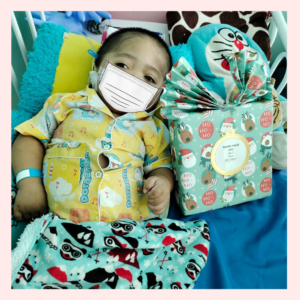 That day was particularly cloudy. I went down to the lobby with Nurse Rina to meet our driver for a home visit to Dani*, a patient who has been with Rachel House for about a year. Nurse Rina explained to me that Dani is a 2-year old boy with hydrocephalus, which is apparent from the large mass on his head. The mass is around the size of a baseball, or slightly bigger.
That day was particularly cloudy. I went down to the lobby with Nurse Rina to meet our driver for a home visit to Dani*, a patient who has been with Rachel House for about a year. Nurse Rina explained to me that Dani is a 2-year old boy with hydrocephalus, which is apparent from the large mass on his head. The mass is around the size of a baseball, or slightly bigger.
When we arrived, nurse Rina carried the groceries (donated by Rachel House) up the stairs to the room (a small flat) where Dani lives with his parents and grandparents. The room was tiny with limited space for us to move around. Nurse Rina told me that Dani likes to play outside, and most days, he could not stay still. So naturally, when we arrived, I was expecting a lively child – but instead, we were met with a sleepy and drowsy boy.
He was half awake when we first sat on the side of the bed, with his mother by his side. As the mother was talking about the situation of the family, she started shedding tears sharing a recent conflict within the household. “I’ve been suspecting that there is a problem, I’m just not sure what.” Nurse Rina said.
Dani’s parents were informed of his diagnosis during the pregnancy. The young couple made the brave decision then to keep the baby. With his current physical condition, Dani mostly stays at home. As he was slowly falling asleep, Nurse Rina told the mother about how difficult it must be to take care of Dani full time while managing the family conflict. The father, the sole breadwinner of the family, was out and works as a security guard to keep the family afloat; but as it often happens with family, conflicting feelings of frustration among family members over sensitive issues might lead to disagreements and conflict.
The mother, as the primary caregiver, was overwhelmed. Which one should she focus on? The obvious answer would be her child, but of course, it is not as simple as that. Nurse Rina gently offered some alternatives to mitigate possible problems.
As she gently conducted physical assessment on Dani, she checked with the mother the medicine that are being prescribed and administered to Dani. Dani has several medical complications, an obstruction in his right lung and issues with his kidney. As he breathes, and especially when he sleeps, he would make noises that indicate his difficulty in breathing. He has also being diagnosed with Diabetes Insipidus, so treatments have to be planned carefully.
“At this age, and with his condition, the child wouldn’t be able to tell us if he’s in pain. So, we really need to be more vigilant and look out for signs or changes in behaviour.” Nurse Rina explained this to me and the mother.
They also have an upcoming surgery scheduled for Dani – to drain the fluids from the mass on his head to prevent further damage and pain. However, the outcome is not certain. These types of decisions are not very easy to make, but after consulting with both the doctor and Nurse Rina, the mother’s only choice is to be brave to go on with the decision.
As we were getting ready to leave, I wanted to confirm what bothered her the most. “It’s the family issue, isn’t it?” She slightly nodded and smiled faintly, then looked at her son – now slowly waking up, as if knowing our visit was over. We said goodbye without saying much, just an understanding look at each other. As she closed the door, I know I will always remember her as a strong and caring woman who dares to keep going with all the hardships in life.
*name changed for privacy